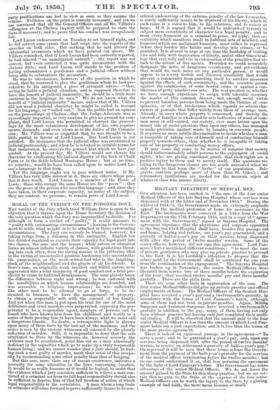MORAL OF THE VERDICT ON THE POISONER DOVE. THE verdict
of the Jury which tried. William Dove is open to the objection that it throws upon the Home Secretary the decision of the very question which the Jury was impannelled to decide. For although in form a verdict of " guilty," it really amounts to "guilty with extenuating circumstances" ; leaving to the Govern- ment to settle what weight is to be attached to those extenuating circumstances. The Jury can scarcely be blamed, however, for taking refuge from a dilemma in this ambiguity. English law has divided mankind as regards their capacity for legal guilt into two classes, the sane and the insane ; while nature or education forms an almost infinite variety of classes, with gradations blend- ing into each other, from the raving maniac or the jabbering idiot to the victim of uncontrolled passions hardening into uncontrolla- ble propensities, or the weak-witted fool who is the laughing- stock of the neighbourhood and the plague of all his friends. In Dove's case, an originally weak intellect and wilful nature were aggravated into a total incapacity of good conduct and a fatal pro- clivity to crime by habitual drunkenness. The man plainly knew the difference between right and wrong ; he was endowed with the sensibilities on which human relationships are founded, and was accessible to religious impressions ; he was sufficiently like other men to be allowed to go at large, to be in- structed in business, to have the management of property, to obtain a respectable wife with the consent of her family. And yet when this man is put upon his trial for one of the most deliberate and cruel murders ever perpetrated, supposing the per- petrator to be a responsible agent, numbers of persons can be found who have known him from his childhood and testify to a series of facts proving him to have been always what we must call a dangerous lunatic. No doubt, a retrospective light is thrown upon many of those facts by the last act of the madman, and the series is seen by the various witnesses all coloured by the ghastly reflection of murder. Still, it is impossible to deny that the acts attributed to Dove by the witnesses do, however severely the evidence may be scrutinized, point him out as a man abnormally deficient in the capacities which go to make up a truly responsible human being ; and we cannot wonder that a jury should, in find- ing such a man guilty of murder, mark their sense of this incapa- city by recommending some other penalty than that of hanging.
ut this case, more than any of recent occurrence, indicates a necessity for some alteration in the laws concerning lunatics. It would be as really humane as it would be logical, to insist that the evidence which a jury considers sufficient to relieve a man con- victed of a criminal aot from its full legal responsibility should also be sufficient to deprive him of thatfull freedom of action of which legal responsibility is the correlative. A man whom a long train of witnesses will come forward to prove sufficiently insane to be con-
sidered undeserving of the extreme penalty of the law for murder, is surely sufficiently insane to be deprived of his liberty, which in such cases is a curse to him, to his relations, and to society at large. If it is argued that it would be unheard-of tyranny to subject mere eccentricity of character to a legal penalty, and to treat every humorist as a criminal in posse, we reply, that ec- centricity which manifests itself in habitual acts of mischief, and humours which are malignant humours, must either be repressed before they harden into habits and develop into crimes, or be punished. It is absurd to urge at one time the hardship of visiting vice and folly with deprivation of liberty, and at other times to al- lege that very folly and vice in extenuation of the penalties that at- tach to the action of free agents. Provided we could accurately designate the notes of dangerous eccentricity, and get evidence that would fix such notes on any particular person, it would appear to us a very foolish and diseased sensibility that would. prevent a community from guarding itself by anterior measures against the effects of such eccentricity, and the eccentric person against the commission of some horrid crime or against a con- tinuance of petty mischievous acts. The real question is, whether we have enough experience to assign with tolerable accuracy the marks of this common disease, and enough social virtue to prevent harmless persons from being made the victims of con- spiracies, or of that intolerance which regards as odious cha- racters or pursuits that differ widely from those of average men. Already, in cases where property is concerned, and thereby the interest of families is awakened to acts indicative of want of com- mon sense or self-control, our society, ever more intent upon the money side of social questions than upon any others, has managed to make provision against waste by lunatics or eccentric people. It requires no more subtile discrimination to decide whether a man is incapable of taking care of himself and of conducting himself properly towards others, than whether he is incapable of taking care of his property or conducting money affairs.
It may some day come to be matter of surprise that society should indiscriminately admit persons to the enjoyment of social rights, who are giving continual proofs that such rights are a positive injury to them and to society itself. The questions re- lating to the dangerous classes are too much narrowed when we only mean by that term the " Arabs " of our population. Bel- gravia contains perhaps more of them than St. Giles's ; and reformatory institutions are needed for the mauvais sujets of whatever class who misuse liberty.


























 Previous page
Previous page